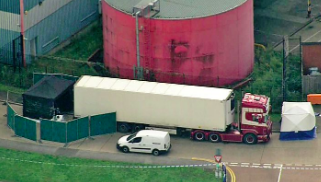ANH NU TRUONG WRITES – Internationally, today, there are around 20 to 40 million people in modern slavery, otherwise known as human trafficking. Yet cases are difficult to assess because, according to the United Nations, the vast majority go undetected. Only about 0.4% cases are identified. And in Vietnam, human trafficking continues because the government does not work sufficiently to solve the issue.
“The Scarecrow” – a word that Vietnamese living in the UK use to refer to illegal immigrants – means worthless and unknown, and for good reason. As soon as Vietnamese citizens start their journey, their passports are burned and discarded in order to deny citizenship. Why? Because, based on The European Union (EU) law on asylum, if you have illegally left your home country and been denied asylum, you will be deported to the country through which you were previously traveling. That means another chance to live in another country, instead of going back to Vietnam.
And why, in turn, is that such a lure? Consider the glamorous advertisements about living elsewhere; news from relatives or friends who have succeeded in crossing the border and who “share experiences” about settling down; the prospect of government financial support so as to go to school, get a job, buy a house, all within a relatively short time… and maybe, even, send money to those left behind in Vietnam. But human trafficking is very costly. The debts pile up, as do high-interest loans, so workers need to work even harder to pay back the money that lay behind their dreams and hopes for a better life.
On 23 October, the bodies of 39 people were found in a lorry container in Essex, Eastern England. By analyzing fingerprints, DNA and 500 evidence artifacts, including cell phones, police quickly found out that the victims– 31 men and 8 women, including both mature and young adults– were Vietnamese citizens. Essex police also stated that these 39 victims belonged to a cross-border delegation of more than 100 people who entered the UK. The deaths of these 39 Vietnamese citizens has been a “wake up call” to the country they fled.
Why is it that Vietnam, a country that has made much economic progress in the last quarter century, still compels people to leave? For one thing, not everyone in Vietnam truly has equal rights, and not everyone has the good fortune to be able to study abroad, or get a visa to work abroad and to pursue a life-changing dream. Most who leave are young workers in poor rural areas who live far away from technologies and information systems that might dispel misconceptions about easy living elsewhere.
The toughest part of the journey is the means of transport– through lorry containers, or diving under rivers, passing through dark forests and crossing the borders of China, Russia, Germany, Ukraine and Poland– all this, while trying to avoid police, limit danger as well as survive hunger and cold. No wonder countless people have died on their way to “the promised land.”
Some even die after reaching their destination. There are few job opportunities for illegal Vietnamese migrants. Some secretly work in Vietnamese restaurants, nail salons or illegal (marijuana) grass farms – where they think it will be easy to earn large amounts of money. Some are even tricked into working as prostitutes. Such people have no rights in England.
Since the Essex deaths, shouldn’t the Vietnamese government have learned to change the way people think about getting rich and making money? Shouldn’t the government publicize the difficulties and dangers of human trafficking? Lastly, shouldn’t the Vietnamese government develop policies to help disadvantaged families in rural Vietnam, by creating job opportunities, so that standards of living improve? Then, and only then, will illegal migration seem less alluring.

